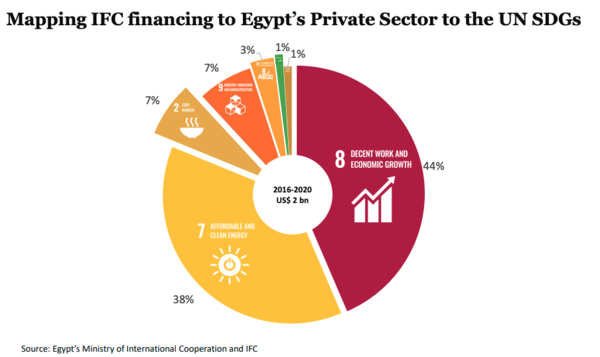In a patch of desert to the west of the Nile, more than six million solar panels harvest the energy of the sun, helping to light thousands of homes and businesses — and offering a glimpse of Egypt’s green future.
In 2019, Egypt unveiled its flagship Benban Solar Park, the world’s largest solar installation. Spanning 36 square kilometres of desert, in 32 plots developed by over 40 companies from 12 countries, it generates over 1500mW of power.
Advertisement
Benban, which is so large it is visible from space, is the biggest signal yet of Egypt’s commitment to clean, sustainable energy, and a testament to the power of partnership between the public and private sectors.
Today, the park is optimising the price of energy, strengthening Egypt’s energy mix, adding more local resources and will help avoid millions of tons of greenhouse gas emissions; it also created thousands of jobs, boosting Egypt’s economy.
Think green; act green
The high ambitions for a greener future in Egypt are based on strong commitment, as well as capacity to unlock a green transformation in the country. The origins also stem from memories of constrained fuel supplies and hours of load shedding. Egypt’s government is on a mission not only to ‘think green’ but also ‘act green’ in all policies and projects to help preserve the environment and bring sustainable energy to the country's population.
To meet the rising energy demand as the population increases, Egypt has been implementing its sustainable energy strategy, ISES 2035, which involves increasing the use of renewable energy and improving energy efficiency in the power sector. The government has set targets for renewables to make up a 42% share of the country’s electricity by 2035.
And, since the Renewable Energy Law (Decree Law 203/2014), the private sector has been encouraged to play a role in the country’s green transformation strategy and produce electricity from renewable energy sources.
Advertisement
A number of initiatives have appeared in the market: KarmSolar was the first private solar integrator in Egypt to obtain a license from the Egyptian Electricity Regulatory Agency. This helped Egypt become one of the Middle East and North Africa's leading countries in renewable energy in the recent 2020 Solar Outlook Report.
The Government of Egypt is also putting sustainability at the heart of the growth agenda. In September 2020, the government closed the Middle East’s first issuance of a sovereign green bond, earmarked for a portfolio of green projects worth $1.9bn. In 2020, it has approved some 691 green projects with a combined investment volume of around $28.6bn, including an electric train project in Cairo, more renewable energy projects and an innovative green hotel certification program.
Within the public sector domain, the Al Mahsamma wastewater treatment plant in the Sinai Peninsula is the world’s biggest agricultural drainage treatment plant for water recycling and reuse. As well as supporting the natural ecology of Al Temsah Lake, water from the plant is helping to cultivate some 70,000 acres of land. That is creating new jobs and boosting the development of sustainable communities in the area.
These, and many other initiatives, are helping to position Egypt as a regional green champion. While many emerging economies in Africa are at a point where their future development, industrialisation and urbanisation could be transformed to a green model, Egypt is leading the way.
But, the path to a greener economy is not always easy. The right regulatory framework must be in place and sources of long-term financing available to help the government achieve sustainable pricing. This is where a strong partnership between countries and development finance institutions like IFC are critical. Governments must also have a clear commitment to reforms.
As the COVID-19 pandemic continues to ravage economies around the world, we believe that committing to a green economy holds the key to a more resilient and sustainable future, not just in Egypt but across the Middle East and Africa.
Why going green is important
Green nowadays is very often synonymous with lowest cost. Essentially, rebuilding an economy in a green way makes not only for a cleaner environment—it also saves costs and makes the economy more robust and resilient to external shocks. All these attributes attract international investors looking for good opportunities. For this reason, greening Egypt’s economy can help unleash public and private
capital flows and support low-carbon, resource-efficient growth and job creation.
This is why in Egypt we need to do more to hurry the transition. An IFC analysis of climate pledges by Egypt, Jordan and Morocco estimates a total climate-smart investment potential of $265 billion between now and 2030. Cities in these three countries alone could attract billions in investment in green buildings, public transport, electric vehicles, waste solutions and renewable energy.
To harness this potential, governments must ensure a conducive regulatory environment that encourages investment, both foreign and domestic.
Financing the development agenda requires collaboration among all stakeholders involved. To that end, the Ministry of International Cooperation in Egypt and IFC mapped current IFC private sector financing to the United Nations Sustainable Development Goals to align our joint cooperation with the 2030 Agenda (see infographic above).
The Covid-19 pandemic has shown us our vulnerabilities but has also provided us with an opportunity to rebuild greener, more resilient, less dependent economies. Egypt is embracing the challenge and working hand in hand with the multilateral and bilateral development partners to bring private investment and innovation to the country. We hope the rest of Africa and the Middle East will follow.
Rania Al-Mashat is Egypt's minister for international cooperation. Sérgio Pimenta is the vice president for the Middle East and Africa at the International Finance Corporation.
